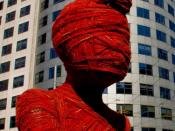In the article entitled, "Uncaptive Minds" the author presents the reminder of the moving power of hope and how those who argue, sometimes understandably, against the provision of education in correctional facilities are choosing punishment over rehabilitation. The difference is the prisoner who returns to society hardened, as opposed to the one who is released is having a sense of hope and self-worth. "One person to have benefited from such an education is Mika'il DeVeaux, a slim, 48-year-old black man who served 25 years for murder. DeVeaux studied theology at Sing Sing and got an M.A. in sociology. After he was released in October 2003, he founded an organization in New York with his wife called Citizens Against Recidivism." (Buruma 1). Buruma's goal was to capture the essence and give us knowledge of how released inmates feel and what they go through when they are released from prison after a long sentence and find themselves unable to rejuvenate from all those years and start to live again.
The Eastern New York Correctional Facility is a maximum-security prison that offers education to inmates that potentially want to better themselves.
"Uncaptive Minds" brings us inside the world of the Eastern Correctional Facility where the Bard Prison Initiative was set up and is now offered to inmates. "The Bard prison initiative was set up by Max Kenner, who graduated from Bard College in 2001. He spent the summer driving around from prison to prison, meeting with staff members and inmates to find out what kind of education program was most needed. He found many administrators receptive to the idea of a higher-education program; there was overwhelming enthusiasm among the inmates." (Buruma 2). The Bard Prison Initiative is a program that is helping restore high education to the prisons in New York. Kenner found many administrators in the prison receptive to the idea of a higher-education program in the prison. The Eastern Correctional facility now runs an associate degree program with plans to introduce a bachelor's program. (Buruma 2). "Inmates have to go through an application process like any prospective college student: an essay, test scores, transcripts (G.E.D.'s for those who didn't finish high school) and an interview by Kenner and his colleague Daniel Karpowitz. ''The admission process,'' Kenner said recently, ''is emotionally the hardest part of our work. Up to 200 apply for 15 spots.'' Only 50 students, out of a prison population of more than 1,200, are now enrolled." (Buruma 2).
Buruma has vivid explanations of the prison. "The first thing you notice inside is the spotlessness of the floors, which is no wonder, since there are always men around mopping and buffing. We walked through a narrow corridor with yellow lines on the floor. Inmates in olive green uniforms filing past us greeted Theresa with elaborate courtesy." (Buruma 2). He explains how the prisoners greeted him and his escort, Theresa, through the halls in the way to his first class in the vocational section where inmates engage in metalwork and other manual skills. "Since prison rules dictate that all men in ''voc'' wear work boots and pass through metal detectors, my students did not like coming here. It meant they had to take off their boots and belts and submit to a body search, always a humiliating business." (Buruma 2). Buruma noticed that his students did not like coming to his class for that particular reason. He explains how he was very optimistic about his students and how when they addressed him as "professor" he realizes that is it formally for their own self-respect not necessarily his. "The students were smart, streetwise and funny, and I found it impossible not to be charmed by them. They were also clearly grateful to be in class, where they were treated as intelligent adults. It is easy to feel a little smug about dealing with these men, to feel a sentimental solidarity with them against the guards and the rest of their oppressive world." (Buruma 3). Buruma observed that you don't ask another inmate what they were in for. "I didn't want to know the students' crimes. Otherwise you can't deal with them objectively." (Butler in Buruma 3).
Buruma's curiosity took over and he couldn't help but look up their sentences on the department of corrections Web site. He was fascinated by them; they each had their own story and how if you didn't know that they were prisoners you would think they were regular people. "One warm day in April, after two months of teaching, I attended an anniversary celebration of the Bard Prison Initiative at Eastern. A jazz band of inmates and volunteers was playing in the yard, while prisoners in white aprons served lemonade and chocolate cake. Speeches were made, by inmates and by Superintendent Miller, who has the avuncular manner of a rural bank manager. Words like ''respect'' and ''future'' and ''self-improvement'' flew thick and fast. The sun was shining, but one of my students, catching my eye, whispered, ''It's miserable.'' (Buruma 4). The student told him how his father abused him when he was a child and it eventually grew onto him and how he killed his foster with a kitchen knife because he found out that he was abusing his charges. It is almost as if the abuse that he had gotten from his father rubbed off on him and his feelings and anger about betrayal, he lost control. Maybe he associated the betrayal of his foster father to the betrayal of his real father? Nevertheless, he still have more than 12 years of his sentence to go.
"It was obvious to me, as a teacher, how precious education was to the students, not only because they could practically recite every sentence of the books and articles I gave them to read but also because of the way they behaved to one another. Prisons breed cynicism. Trust is frequently betrayed and friendships severed when a prisoner is transferred without warning to another facility. The classroom was an exception." (Buruma 4). "On my last day at Eastern, I turned back toward the prison as I was leaving. There, high above me, I could just make out a face, pressed against the bars of a cell. It was my youngest student, the one who knifed his foster father. As I drove off, I glanced into my rearview mirror. All that moved in the mass of brick and steel bars behind me was a pale arm waving." (Buruma 5).
"Uncaptive Minds" focuses on education in the Eastern Correctional Facility in New York. Making a comparison from this article to the Education chapter is a difficult process. Shepard doesn't talk about education in prisons, but rather education in a regular environment, the functions that education serves, structures of education, reforms in the classroom, educational inequality a etc.. According to Shepard, schools expose students to a wide variety of perspectives and experiences that encourage them to develop creativity, verbal skills, artistic expression, intellectual accomplishment, and cultural tolerance. (345). In comparison to Buruma's experience in the prison and what he himself learned about his students, especially the student that stabbed his foster father, is that he gave his confidence to speak up about what he has done. At the end of the article Buruma states that when he was leaving he glanced at his rearview mirror and saw the boy wave at him. The impact that education has on these inmates is a great one. This boy saw something in his professor where he could speak to him about his situation, indirectly. Perhaps, and back to the theory that this boy has negative feelings towards a father figure, so therefore, he wants to replace the negative image of his father with his professor.
According to Shepard, the basic purpose of education is the transmission of knowledge. (337). Though this definition is not very broad nor it connects to the topic of correctional facilities' education, but it relates to what Buruma experienced in the facility. He taught them a lot about history, specifically The Last Samurai. These students felt deeply connected to him and they, to, taught him things through class discussion.
Having read "Uncaptive Minds" it was clear that education plays a big role to these inmates, regardless what they have done. It is understanding that Buruma changed their take on life and gave them hope that when they eventually get out they will be able to start a new life and not be alienated. Buruma felt it too; the connection between his students is intense and rewarding. He stated that they called him professor, but for their own self-respect. It is also clear that they understand the wrong they did and they want to change it through education and through knowledge. It's amazing how people's views change through different knowledge and when it is applied to their personal experiences. Buruma's experience is inspirational because it shows that there is still faith, even in people that, by some standards, may not deserve it. Its inspirational to know that even prison guards, like Theresa, who was Buruma's escort through the prison. It is also moving to know that there is still faith in the system.
Works CitedBuruma, Ian. "Uncaptive Minds." (2005): 1-5. Print.
Shepard, Jon M., Sociology. 9th. Wadsworth Publishing, 2006. Print.





